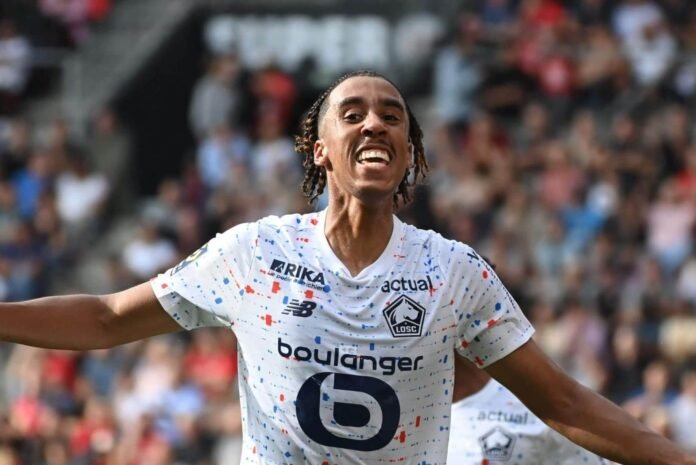What were you doing the day before your 18th birthday?
In Leny Yoro’s case, November 13 last year represented just another challenge, as his Lille team took on Toulouse in a Ligue 1 match.
The centre-back scored with a near-post flick-on into the far corner, but was later substituted due to an injury. He recovered to play the full 90 minutes in 20 of Lille’s final 22 league games and help them finish fourth — enough for Champions League football next season. They also had the joint third-best defensive record (34 goals conceded) in Ligue 1.
His defensive presence, ease on the ball and maturity brought the teenager praise and, eventually, interest from major European clubs.
As The Athletic reported last week, Real Madrid are the frontrunners to land Yoro this summer, with Manchester United, Paris Saint-Germain and Liverpool also in the mix.
Here is a detailed breakdown of why he is being courted so fiercely.
Get the latest transfer news on The Athletic…
Yoro is a throwback defender in some respects, due to his tendency to operate as the last man in Lille’s back line. This means his defensive involvements, such as blocks (0.67 per 90 minutes) and tackles, are limited in volume, as shown in the table below, which compares his numbers to the centre-backs already at Liverpool, Madrid, United and PSG.
(Note: Militao, Alaba and Martinez missed most of 2023-24 due to injury)
Defensive actions in league (per 90min)
| Player | Club | Season | Total Tackles | Tackle Win % | Aerial duel success % |
|---|---|---|---|---|---|
|
Leny Yoro |
Lille |
2023/24 |
1.2 |
69.4 |
63.8 |
|
Eder Militao |
R.Madrid |
2022/23 |
1.5 |
69.9 |
65.4 |
|
Antonio Rudiger |
R.Madrid |
2023/24 |
0.9 |
58.1 |
68.1 |
|
David Alaba |
R.Madrid |
2022/23 |
0.7 |
74 |
57.9 |
|
Lisandro Martinez |
Man United |
2022/23 |
2.3 |
51.7 |
50.8 |
|
Harry Maguire |
Man United |
2023/24 |
1.3 |
71 |
78.4 |
|
Virgil van Dijk |
Liverpool |
2023/24 |
1.1 |
57.5 |
81.4 |
|
Ibrahima Konate |
Liverpool |
2023/24 |
2.1 |
61.2 |
71.3 |
|
Jarell Quansah |
Liverpool |
2023/24 |
1.9 |
87.8 |
67.2 |
|
Milan Skriniar |
PSG |
2023/24 |
1.3 |
74.4 |
49 |
|
Marquinhos |
PSG |
2023/24 |
1.1 |
57.7 |
52.2 |
|
Lucas Beraldo |
PSG |
2023/24 |
2 |
63.8 |
50 |
While he stays deeper, Yoro is agile and reads danger well, akin to Liverpool’s centre-back and captain Virgil van Dijk.
In this clip below from a 0-0 draw with Montpellier in January, he hangs back when the home side counter from midfield but is aware of what is coming next, which allows him to slide in at the right time and cut off the supply to striker Akor Adams.
Yoro averaged 1.2 interceptions per 90 minutes in Ligue 1 last season, while committing just 0.7 fouls and 0.03 errors per 90, all of which point to his defensive upside.
His interception numbers were only bettered by five of the 11 defenders in the table above, while eight committed more fouls and seven committed more errors than him per 90. While this does not suggest he is better than those players, it indicates Yoro’s stylistic approach involves reading and reacting to danger rather than aggressively closing down opponents. The parallels with Van Dijk (1.1 interceptions, 0.7 fouls committed and no errors) are evident.
Given his age and the areas he typically occupies on the pitch, it is not surprising that Yoro tends to err on the side of caution with both his passing and ball carrying.
As a result, he completes most of his attempted passes, which are largely confined to his team’s half of the pitch. However, he has also shown that he can attempt and complete more ambitious passes into opposition territory, as he does below in the second leg of Lille’s Europa Conference League quarter-final defeat against Aston Villa in April.
Yoro floats a pass over to left-winger Gabriel Gudmundsson, who takes his man on before cutting the ball back into the box for Yusuf Yazici to score.
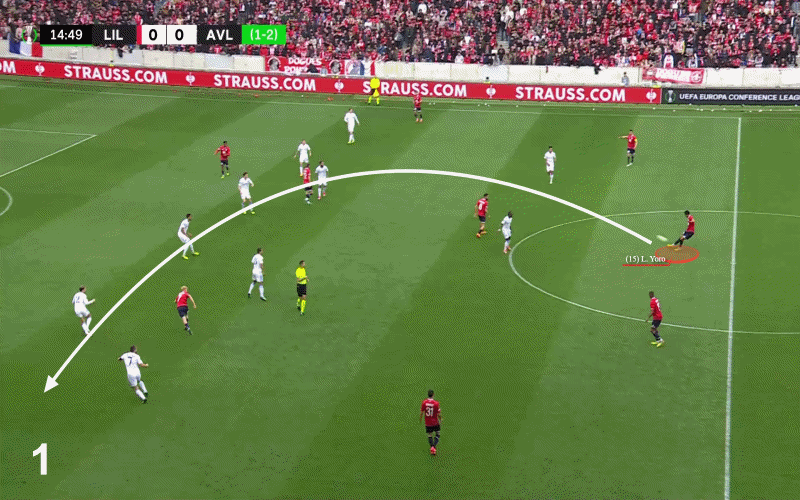
When compared to centre-backs from the four elite teams interested in him, Yoro’s preference for shorter passes over long passes or diagonals is shown by his lower rate of long passes (30-plus yards). It is worth noting, however, that Liverpool, Madrid and PSG all typically operate higher up the pitch than Lille, and typically enjoy more possession in their games as well.
Passing in league (per 90min)
| Player | Club | Season | Passed Attempted | Pass Completion % | % of passes long |
|---|---|---|---|---|---|
|
Leny Yoro |
Lille |
2023/24 |
63.3 |
92.1 |
10.3 |
|
Eder Militao |
R.Madrid |
2022/23 |
62.6 |
88.3 |
14.5 |
|
Antonio Rudiger |
R.Madrid |
2023/24 |
60.3 |
89.8 |
12.1 |
|
David Alaba |
R.Madrid |
2022/23 |
58.2 |
87.6 |
8.3 |
|
Lisandro Martinez |
Man United |
2022/23 |
65.1 |
87 |
12.6 |
|
Harry Maguire |
Man United |
2023/24 |
60.1 |
83.1 |
16 |
|
Virgil van Dijk |
Liverpool |
2023/24 |
81.8 |
91.4 |
11.3 |
|
Ibrahima Konate |
Liverpool |
2023/24 |
83.7 |
87.9 |
9.6 |
|
Jarell Quansah |
Liverpool |
2023/24 |
88.6 |
88.6 |
9.8 |
|
Milan Skriniar |
PSG |
2023/24 |
100.6 |
95.3 |
8 |
|
Marquinhos |
PSG |
2023/24 |
105.8 |
94.4 |
10.5 |
|
Lucas Beraldo |
PSG |
2023/24 |
86.4 |
89.6 |
7.4 |
With respect to ball-carrying, Yoro rarely loses the ball, but his progression numbers are low. Progressive carries here refer to those which move the ball at least 10 yards towards the opposition’s goal or go into their penalty area.
Carries in league (per 90min)
| Player | Club | Season | Carries | % of carrier that are progressive | Times dispossessed |
|---|---|---|---|---|---|
|
Leny Yoro |
Lille |
2023/24 |
55.2 |
0.5 |
0.0 |
|
Eder Militao |
R.Madrid |
2022/23 |
45.9 |
2 |
0.2 |
|
Antonio Rudiger |
R.Madrid |
2023/24 |
44.4 |
1.3 |
0.1 |
|
David Alaba |
R.Madrid |
2022/23 |
38.1 |
2 |
0.2 |
|
Lisandro Martinez |
Man United |
2022/23 |
45.2 |
1.1 |
0.4 |
|
Harry Maguire |
Man United |
2023/24 |
38.2 |
2.9 |
0.1 |
|
Virgil van Dijk |
Liverpool |
2023/24 |
56.1 |
1.6 |
0.1 |
|
Ibrahima Konate |
Liverpool |
2023/24 |
61.8 |
2.2 |
0.3 |
|
Jarell Quansah |
Liverpool |
2023/24 |
67.6 |
1.4 |
0.2 |
|
Milan Skriniar |
PSG |
2023/24 |
90.1 |
0.3 |
0.1 |
|
Marquinhos |
PSG |
2023/24 |
97 |
1.1 |
0.1 |
|
Lucas Beraldo |
PSG |
2023/24 |
74.3 |
0.8 |
0.2 |
Yoro mostly tends to take the conservative option even when he is afforded space, as in this sequence below from a 2-2 draw with Nice in May.
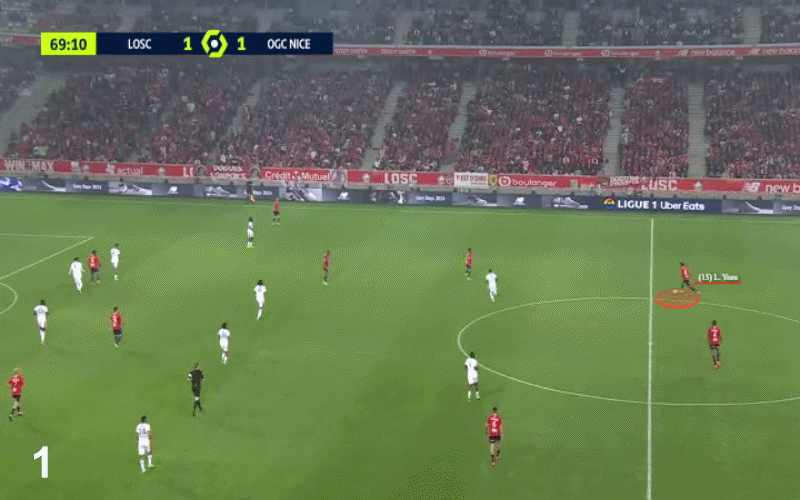
The chart below provides a summary of Yoro’s strengths (passing distance and carries attempted) and weaknesses (ball progression) with respect to passing and carrying from last season.
It is worth noting, however, that some of this is again down to team style and coaching demands.
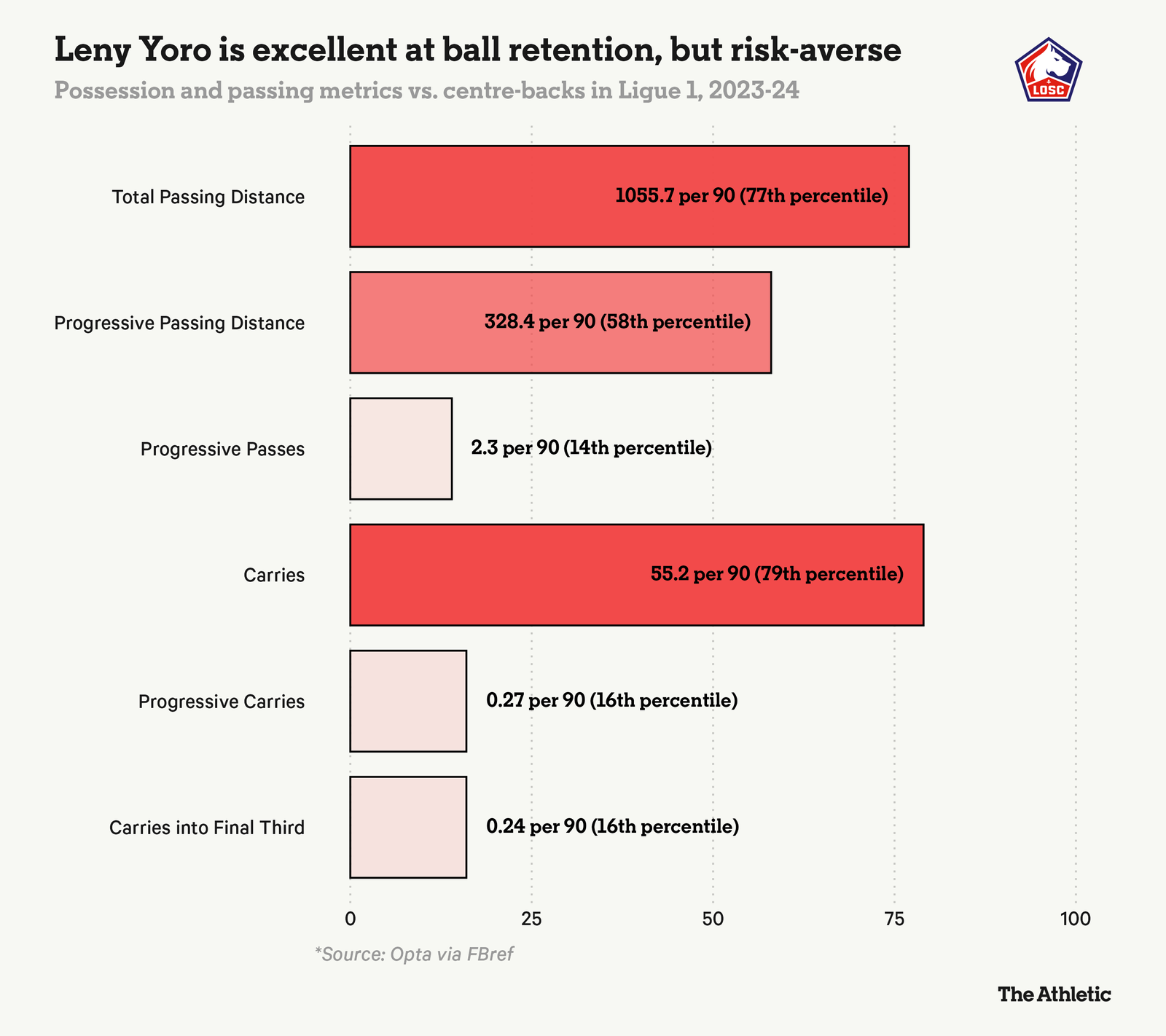
So, how and where would he fit in?
While four of Europe’s biggest clubs are interested in Yoro, none of them may require him to start immediately if he joins, given the options they have available. In addition to those in the tables above, Liverpool and Manchester United have Joe Gomez and Victor Lindelof respectively, while PSG are awaiting Presnel Kimpembe’s return from an Achilles tendon injury that’s kept him out for over a year and Madrid have a plan to use midfielder Aurelien Tchouameni in central defence.
The advantage Yoro brings is that he has the qualities needed to step into the starting XI of these sides but can also be developed for a season before becoming a full-time first-choice.
At Lille, he has frequently played alongside Alexsandro Ribeiro, who took more risks in possession (64.2 carries, 0.28 times dispossessed and 0.9 per cent progressive carries share) and engaged with opponents up the pitch (24.6 per cent tackles in the middle third compared to Yoro’s 19.2 per cent). Ribeiro was also more expansive with his passing (11.1 per cent long pass share; 3.36 passes into the final third, compared to Yoro’s 1.75).
Based on data from the tables above and their ability to defend high up the pitch, both Madrid’s Eder Militao (39.2 per cent tackles in the middle-third) and Liverpool’s Ibrahima Konate (35.9 per cent) project as complementary partners for Yoro. However, Militao, Konate and Yoro are all right-sided centre-backs. He should also be a decent fit alongside PSG’s Marquinhos, Milan Skriniar and United’s Lisandro Martinez, who can play on the left side and boast great ball-progression abilities, but the trio’s struggles in aerial duels could pose an issue.
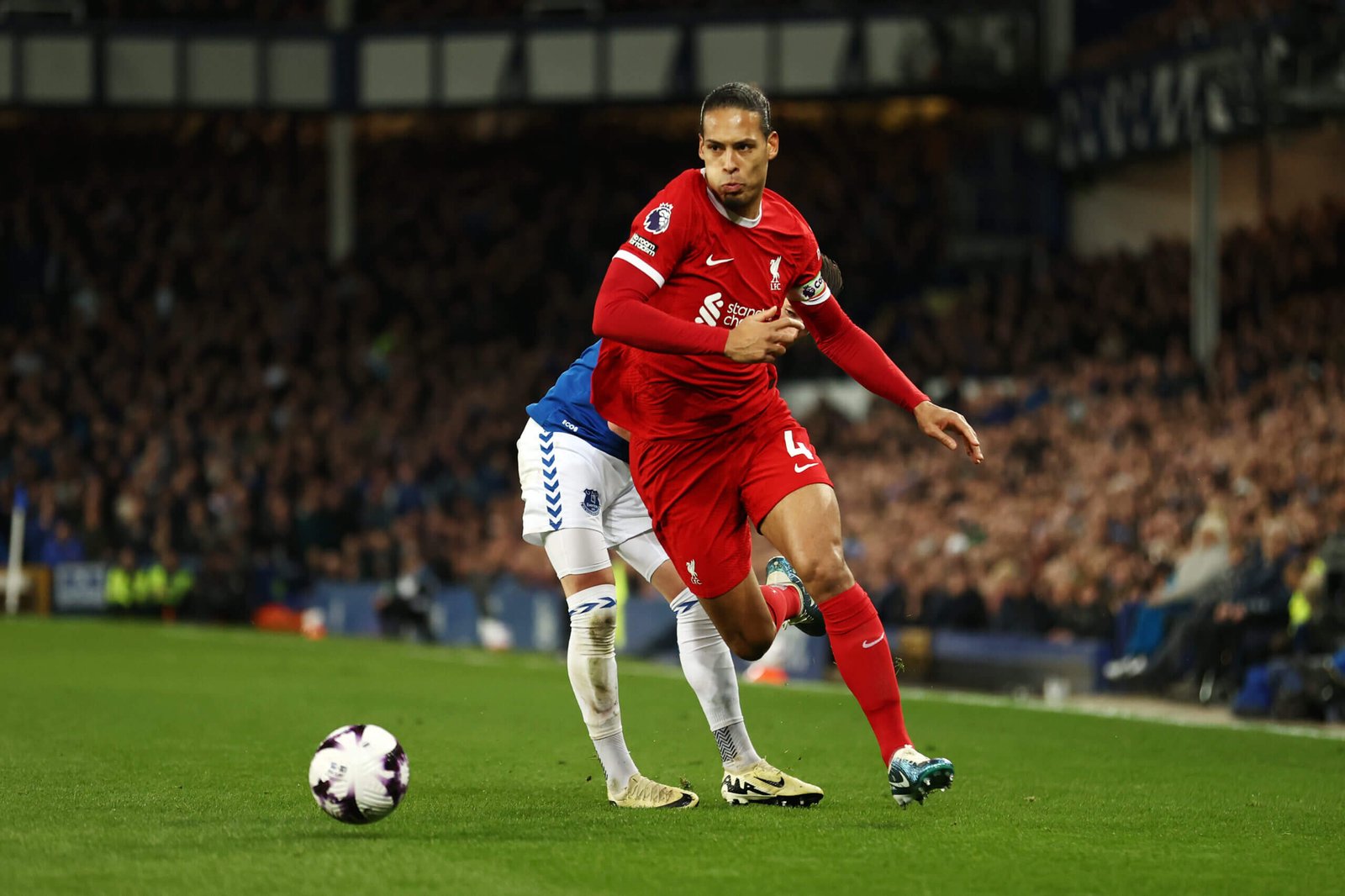
(Naomi Baker/Getty Images)
Similarly, Van Dijk’s incredible ball progression should counter Yoro’s lack of it, with the Dutchman also preferring to play as a left centre-back, but both defenders tend to sweep up behind a partner, which could cause issues for Liverpool when opponents attack. Lastly, United’s Harry Maguire, while effective with his passing and defending, does not attempt many carries (38.2 per 90 last season) and partnering him with Yoro could hurt their build-up play.
It is worth noting, though, that Konate has never played more than 22 league games for Liverpool in a season, while Militao and Martinez both only recently returned from long-term injuries. Additionally, both Van Dijk, 33 next month, and Maguire, 31, are on contracts that expire next summer.
There are other considerations.
Staying in Ligue 1, whether at Lille or with PSG, will give Yoro the chance to continue his progression in more familiar surroundings. But should he choose to leave France, a move to La Liga over the Premier League might be in Yoro’s best interests.
Three of the 11 youngest players in Spain’s top flight last season were centre-backs, compared to none of the 30 youngest in its English equivalent. Simultaneously, seven of the 15 oldest players in the Premier League last season were central defenders, indicating a division-wide preference for experience at the position, in contrast to just two out of 25 in La Liga.
Regardless of what happens in Yoro’s future, his talent suggests he is capable of making the leap to a top side and contributing positively in both the short and long term.
(Top photo: Sebastien Salom-Gomis/AFP via Getty Images)
Read the full article here


